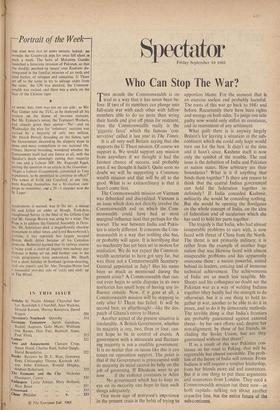Who Can Stop The War?
THIS month the Commonwealth is on trial in a way that it has never been be- fore. If two of its members can plunge into full-scale war with each other with fellow members able to do no more than wring their hands and give off pleas for restraint, then the Commonwealth really is the 'gigantic farce' which the famous 'con- servative' called it last year in The Times.
It is all very well Britain saying that she supports the U Thant mission. Of course we support it. We would support any mission from anywhere if we thought it had the faintest chance of success, and probably even if we thought it hadn't. Quite soon no doubt we will be supporting a Common- wealth mission ,and that will be all to the good. What is so extraordinary is that it hasn't come first.
The Commonwealth mission on Vietnam was debunked and discredited. Vietnam is an issue which does not directly involve the Commonwealth and on which the Com- monwealth could have had at most marginal influence (and that perhaps for the worse). The war between India and Pakis- tan is utterly different. It concerns the Com- monwealth in a way that nothing else has, or probably will again. It is horrifying that no machinery has yet been set in motion for mediation. We do not expect the Common- wealth secretariat to have got very far, but was there not a Commonwealth Secretary- General appointed in July? Has his name been so much as mentioned during the present crisis? A Commonwealth that can- not even begin to settle disputes in its own territories has small hope of having any in- fluence outside. Now, if it goes at all, a Commonwealth mission will be stepping in only after U Thant has failed. It will be second best, an afterthought—like the des-. patch of Ghana's envoy to Hanoi.
Another aspect of the present situation is intolerable. A British Government, whether its majority is one, two, three or four, can- not hope to be in control of events. A government with a minuscule and fluctuat- ing majority is not a credible government. It is no matter that on issues like this it can count on opposition support. The point is that if the Government is preoccupied with its majority its mind cannot be fully on the job of governing. If Rhodesia were to go now . . . if the violence continues in Aden . . . No government which has to keep its eye on its majority can hope to face such things adequately.
One more sign of everyone's impotence
in the present crisis is the habit of trying to
apportion blame. For the moment that is an exercise useless and probably harmful. The roots of this war go back to 194', and before. Recurrently there have been rights and wrongs on both sides. To judge one side guilty now would only stiffen its resistance, and its resentment of any settlement.
What guilt there is is anyway largely Britain's for leaving a situation in the sub- continent which she could only hope would turn out for the best. It didn't at the time and it hasn't since. Kashmir itself is now only the symbol of the trouble. The real issue is the definition of India and Pakistan as nation states. How arbitrary are their boundaries? What is it if anything that binds them together? Is there any reason to think that the central Indian government can hold the federation together in- definitely? If India conceded Kashmir, militarily she would be conceding nothing. But she would be opening the floodgates on the whole concept of India, on the idea of federalism and of secularism which she has used to hold her parts together.
The tragedy is that India, who had almost insuperable problems to start with, is now faced with threat of China from the North. The threat is not primarily military; it is rather from the example of another huge nation that was likewise faced with almost insuperable problems and has apparently overcome them : a nation powerful, united behind its leaders, enticing and of immense technical achievement. The achievements of India are so much less tangible. Mr. Shastri and his colleagues no doubt see the Pakistan war as a way of welding Indians together (they hardly had the strength to do otherwise), but it is one thing to hold to- gether in war, another to be able to do it in peace, and to do it by democratic methods. The terrible thing is that India's frontiers are probably guaranteed against external threat—by her own efforts and, despite her non-alignment, by those of her friends, in- cluding the Soviet Union, but are they guaranteed without that threat'? If as a result of this war Pakistan. con- tinues on her road to Peking, that will be regrettable but almost inevitable. The prob- lem of the future of India will remain. From Indians it will require a tougher leadership, from her friends more aid and assurances. But it is one thing to put these arguments and assurances from London. They need a Commonwealth mission out there now—in both capitals—talking not about another cease-fire line, but the entire future of the sub-continent.


































 Previous page
Previous page